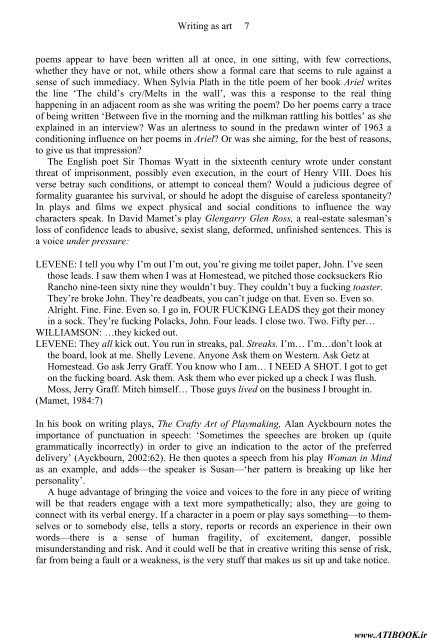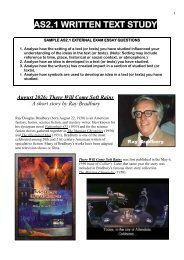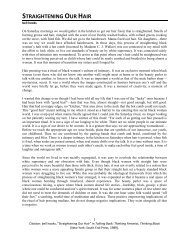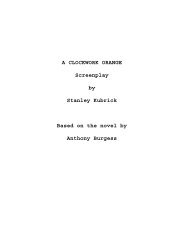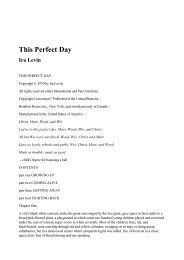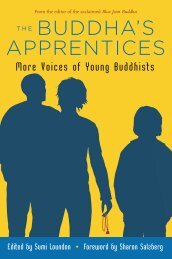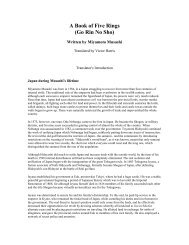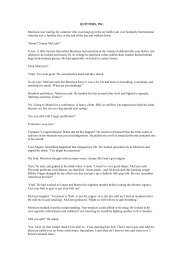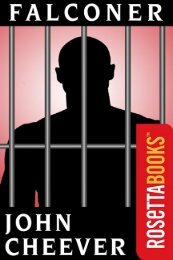9780415317856_the_routledge_creative_writing_coursebook
9780415317856_the_routledge_creative_writing_coursebook
9780415317856_the_routledge_creative_writing_coursebook
Create successful ePaper yourself
Turn your PDF publications into a flip-book with our unique Google optimized e-Paper software.
www.ATIBOOK.irWriting as art 7poems appear to have been written all at once, in one sitting, with few corrections,whe<strong>the</strong>r <strong>the</strong>y have or not, while o<strong>the</strong>rs show a formal care that seems to rule against asense of such immediacy. When Sylvia Plath in <strong>the</strong> title poem of her book Ariel writes<strong>the</strong> line ‘The child’s cry/Melts in <strong>the</strong> wall’, was this a response to <strong>the</strong> real thinghappening in an adjacent room as she was <strong>writing</strong> <strong>the</strong> poem? Do her poems carry a traceof being written ‘Between five in <strong>the</strong> morning and <strong>the</strong> milkman rattling his bottles’ as sheexplained in an interview? Was an alertness to sound in <strong>the</strong> predawn winter of 1963 aconditioning influence on her poems in Ariel? Or was she aiming, for <strong>the</strong> best of reasons,to give us that impression?The English poet Sir Thomas Wyatt in <strong>the</strong> sixteenth century wrote under constantthreat of imprisonment, possibly even execution, in <strong>the</strong> court of Henry VIII. Does hisverse betray such conditions, or attempt to conceal <strong>the</strong>m? Would a judicious degree offormality guarantee his survival, or should he adopt <strong>the</strong> disguise of careless spontaneity?In plays and films we expect physical and social conditions to influence <strong>the</strong> waycharacters speak. In David Mamet’s play Glengarry Glen Ross, a real-estate salesman’sloss of confidence leads to abusive, sexist slang, deformed, unfinished sentences. This isa voice under pressure:LEVENE: I tell you why I’m out I’m out, you’re giving me toilet paper, John. I’ve seenthose leads. I saw <strong>the</strong>m when I was at Homestead, we pitched those cocksuckers RioRancho nine-teen sixty nine <strong>the</strong>y wouldn’t buy. They couldn’t buy a fucking toaster.They’re broke John. They’re deadbeats, you can’t judge on that. Even so. Even so.Alright. Fine. Fine. Even so. I go in, FOUR FUCKING LEADS <strong>the</strong>y got <strong>the</strong>ir moneyin a sock. They’re fucking Polacks, John. Four leads. I close two. Two. Fifty per…WILLIAMSON: …<strong>the</strong>y kicked out.LEVENE: They all kick out. You run in streaks, pal. Streaks. I’m… I’m…don’t look at<strong>the</strong> board, look at me. Shelly Levene. Anyone Ask <strong>the</strong>m on Western. Ask Getz atHomestead. Go ask Jerry Graff. You know who I am… I NEED A SHOT. I got to geton <strong>the</strong> fucking board. Ask <strong>the</strong>m. Ask <strong>the</strong>m who ever picked up a check I was flush.Moss, Jerry Graff. Mitch himself… Those guys lived on <strong>the</strong> business I brought in.(Mamet, 1984:7)In his book on <strong>writing</strong> plays, The Crafty Art of Playmaking, Alan Ayckbourn notes <strong>the</strong>importance of punctuation in speech: ‘Sometimes <strong>the</strong> speeches are broken up (quitegrammatically incorrectly) in order to give an indication to <strong>the</strong> actor of <strong>the</strong> preferreddelivery’ (Ayckbourn, 2002:62). He <strong>the</strong>n quotes a speech from his play Woman in Mindas an example, and adds—<strong>the</strong> speaker is Susan—‘her pattern is breaking up like herpersonality’.A huge advantage of bringing <strong>the</strong> voice and voices to <strong>the</strong> fore in any piece of <strong>writing</strong>will be that readers engage with a text more sympa<strong>the</strong>tically; also, <strong>the</strong>y are going toconnect with its verbal energy. If a character in a poem or play says something—to <strong>the</strong>mselvesor to somebody else, tells a story, reports or records an experience in <strong>the</strong>ir ownwords—<strong>the</strong>re is a sense of human fragility, of excitement, danger, possiblemisunderstanding and risk. And it could well be that in <strong>creative</strong> <strong>writing</strong> this sense of risk,far from being a fault or a weakness, is <strong>the</strong> very stuff that makes us sit up and take notice.


